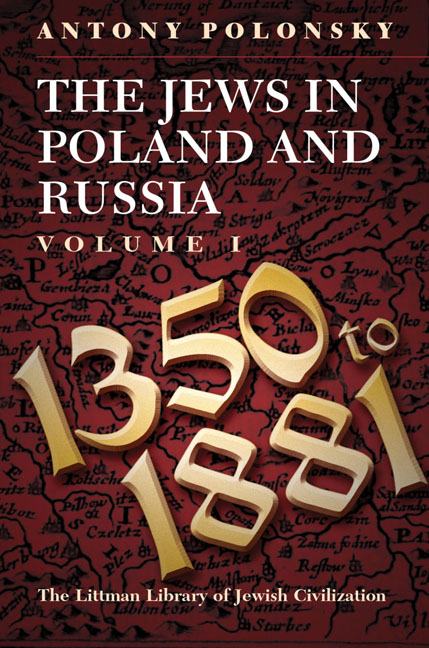Book contents
- Frontmatter
- Dedication
- Acknowledgements
- Contents
- List of Maps
- List of Tables
- Note on Transliteration
- Note on Place Names
- Maps
- General Introduction
- PART I JEWISH LIFE IN POLAND–LITHUANIA TO 1750
- PART II ATTEMPTS TO TRANSFORM AND INTEGRATE THE JEWS, AND THE JEWISH RESPONSE, 1750–1880
- Glossary
- Bibliography
- Index
Conclusion
- Frontmatter
- Dedication
- Acknowledgements
- Contents
- List of Maps
- List of Tables
- Note on Transliteration
- Note on Place Names
- Maps
- General Introduction
- PART I JEWISH LIFE IN POLAND–LITHUANIA TO 1750
- PART II ATTEMPTS TO TRANSFORM AND INTEGRATE THE JEWS, AND THE JEWISH RESPONSE, 1750–1880
- Glossary
- Bibliography
- Index
Summary
WHAT DID the Jews of Poland–Lithuania bring with them as they began to encounter the new political and economic ideas which were to transform the lands in which they lived around the middle of the eighteenth century? In the first place, because of the size of the community and its sense of rootedness and security, its members possessed a strong sense of their own worth and the value of their religious traditions. They found in their religion assurance that their present sufferings would be transformed by a messianic event which would overturn existing social realities and recognize their true worth. In Gershon Hundert's words:
The circumstances under which they lived … created a mentality which acted as a filter through which the new cultural, political and economic currents had to pass. That mentality both buffered Jews and buttressed their defences. And when in the nineteenth century, certain important aspects of this context broke down, the vast majority of these Jews were armored against trauma and splitting—psychological reversals of loyalty—by the mentality that had been formed earlier. Self-affirmation and a feeling of Jewish superiority and solidarity dominated the spectrum of self-evaluation of eastern European Jews.
This self-confidence was linked with the institutions of Jewish communal autonomy. Although these were both oligarchic and male-controlled, they gave to all sections of the community a sense that they participated in its running and had a stake in its success. The transformation of Jewish society was most successful in those areas, such as Prussian Poland, where the communal structures were reformed rather than done away with. Elsewhere the breakdown of the mechanisms of self-government was painfully felt. Speaking at the Kovno conference in 1909, the Russian Jewish activist Genrikh Sliozberg observed, ‘Unfortunately, we have neither a community structure nor a communal organization’, and saw the rebuilding of such a structure as a pressing need.
A key element in the Jewish sense of security in premodern Poland–Lithuania was the alliance of convenience with the nobility, particularly after 1648. However, one of the principal developments in the social history of the lands of the Polish–Lithuanian Commonwealth after the partitions was the undermining, and in most places the end, of the social and economic hegemony of the nobility.
- Type
- Chapter
- Information
- The Jews in Poland and RussiaVolume I: 1350 to 1881, pp. 158 - 159Publisher: Liverpool University PressPrint publication year: 2009

